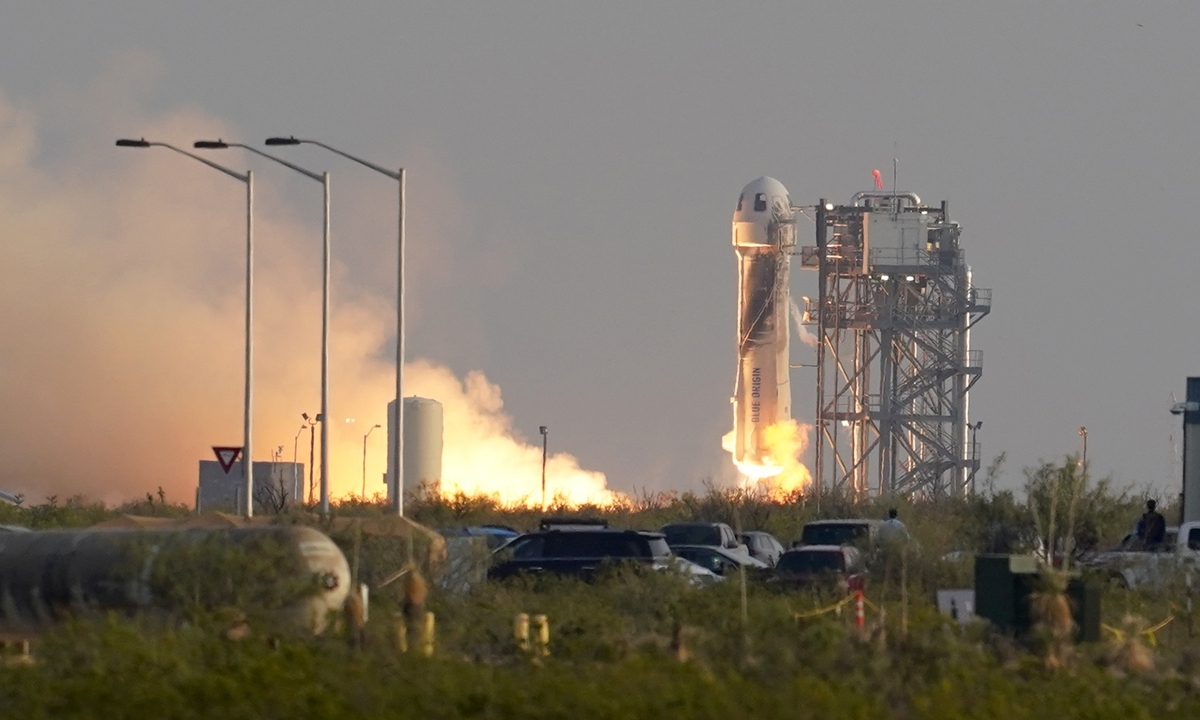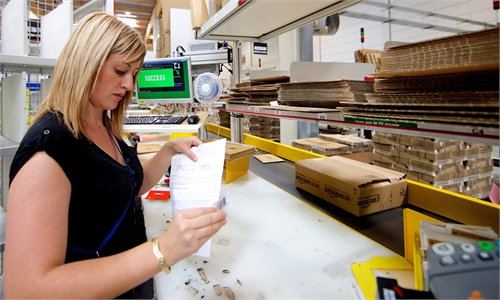Space travel price expected to fall within $30,000-$50,000 range: founder of Galactic Energy

Blue Origin's New Shepard rocket lifts off carrying Jeff Bezos, founder of Amazon and space tourism company Blue Origin, brother Mark, Oliver Daemen and Wally Funk, from its spaceport near Van Horn, Texas, on Tuesday. The capsule returned safely a little more than 10 minutes later. Photo: VCG
With more advanced technology, it is expected that the ticket price to visit the space will fall within the range from $30,000 to $50,000, said a senior executive in China's private space sector.Space travel has huge potential and it is one of the major directions toward which commercial space industry should ramp up efforts, Liu Baiqi, CEO and founder of Beijing-based private rocket firm Galactic Energy, told the Global Times.
Compared with orbital travel, which ticket could come as high as $80 million per passenger, suborbital crewed flights seem more accessible for ordinary people to realize their space dream when technologies and services become mature in the future.
Suborbital space missions have grabbed public attention as the founders of Virgin Galactic and Blue Origin have both successfully completed their maiden flights.
Jeff Bezos, the world's richest person, soared some 107 kilometers above the Texas desert aboard his company Blue Origin's New Shepard launch vehicle on Tuesday and returned safely to Earth.
It came about 10 days after UK entrepreneur Richard Branson soared 85 kilometers above the New Mexico desert aboard his Virgin Galactic rocket plane and safely returned in the vehicle's first fully crewed test flight to space.
Any object that launches to space but does reach sufficient horizontal velocity to stay in space falls back to the Earth and hence they fly in a suborbital trajectory.
Although the two spacecraft launched this month did not reach orbit, the accomplishment of reaching space in a private spacecraft marked a major milestone in the history of humanity, analysts said.
With the combination of declining space launch costs as more commercial space firms join the club, and advances in satellite technology, the prospect of recreational space tourism is set to grow in the next decade, they continued.
Blue Origin has sold nearly $100 million worth of tickets for future passenger flights to the edge of space, Bezos announced on Tuesday, according to a CNBC report, despite it did not disclose how much it prices seats on its New Shepard rocket.
While Virgin Galactic has charged for seats on its future flights between $200,000 and $500,000.
Compared with the US, that has been taking a leading position in the commercial crewed flight sector, China's private commercial space industry is still in its nascent phase.
"Most domestic private players have chosen technology routes that are more market-driven and require no heavy investment, which contributes to their steady growth as we have seen in the past few years," Liu said.
According to Liu, domestic private rocket firms should adopt a three-step pace: sending rocket to orbit, having the abilities to realize steady and continuous launches into orbit, and reusability of the launch vehicle.
In November 2020, Galactic Energy successfully launched a carrier rocket and put a satellite into orbit from the Jiuquan Satellite Launch Center, the first orbital launch by a privately funded Chinese firm since the outbreak of the COVID-19 epidemic.
The launch also marked the second successful attempt by a private Chinese rocket firm since July 2019 following two failed launches in 2018 and early 2019.
Global Times

